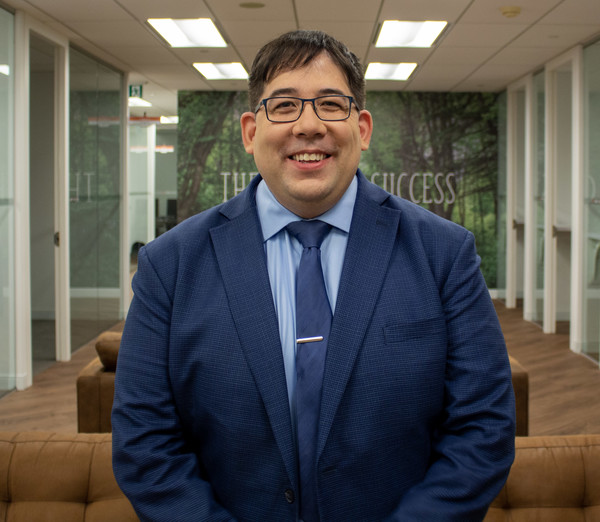Following the opening of the Canada-Korea Digital Health Innovation Forum 2022 on Tuesday, Korea Biomedical Review sat down with two Canadian companies specializing in healthcare digitalization and automation via software solutions.
Verto CEO and founder Michael Millar specifically shared about his company’s digital twin orchestration while Yulcom Technologies Innovation and R&D director Komi Sodoké elaborated on his company’s AI-based image analysis system for medical diagnostics focused on small IoT devices, sometimes referred to as “edge devices.”

Speaking on their differentiated technology solutions in the interview, Sodoké and Millar expressed their wish to find the right Korean company to further advance their technologies.
Verto’s digital twin orchestration platform enables healthcare systems to aggregate data and create digital twins for managing the data flow between multiple systems to successfully automate clinical workflows and population health management.
Technology applications and reasons for choosing Korea
“Given a large dataset of patients going through specific clinical pathways like a hip and knee replacement, it is possible to create predictive journeys that start at patient referral or diagnosis and diverges into individual pathways, ultimately producing varying outcomes,” Millar said.
Once these pathways are trained, a patient that just had hip and knee surgery who reported having lower back pain a month later, can be predicted to have "recovery with complications" - unless a physio appointment is scheduled within two weeks, he went on to say.
“This interpretation of patient history for diagnosis is referred to as patient context and is one of the services we provide with our platform,” he said.
Likewise, Sodoké explained the principle behind his company’s service.
According to Sodoké, AI is widely used in medical image processing but needs large datasets which typically require large servers, GPUs, and other cloud storage systems.
However, Yulcom Technologies wants to make medical imaging more accessible by capturing images on portable medical IoT devices so they can be deployed directly at point-of-care facilities, eliminating the need for separate data centers, Sodoké said.
Furthermore, this enables AI medical image analysis to be expanded to low-resource settings where there are no data centers to facilitate these large datasets.
“Tiny machine learning” (tinyML) best describes this concept and is a relatively newly coined word. It aims to improve the efficiency of deep learning AI systems by requiring less computation and data to facilitate the AI-based IoT device.
“It’s very important for us to connect with Korea’s large IoT market as our company focuses on developing the software but still require the IoT devices to make our solution work,” said Sodoké.
Furthermore, collaborating with Korea for IoTs is more cost-effective as many medical technology companies already have exactly what the Canadian company is looking for, he said. Accordingly, he mentioned, “We have set up meetings with five Korean companies but can’t specify any partners yet as we are scheduled to meet later today.”
Verto CEO said very few countries have such a clear digital health mandate like Korea.
“There are so many digital therapeutics, AI, clinical decision support, decision augmentation technology startups here which is a perfect environment to expand our technology,” Millar said.
Ideal partners and short-mid-long-term goals
He went on to say, “Ideally, we are looking forward to partnering with start-ups who are trying to create integrations that work in an international environment, health systems that are interested in population health management and consulting firms who are dealing with the complexities of patient context.”
In this regard, companies are required to first provide us with clinical pathways that they're interested in because our digital twins are created from these feature sets or characteristics. Otherwise, the data stored in a digital twin will be too large but only key features are needed to identify the clinical journey, he went on to say.
Regarding Yulcom's short-mid-long-term goals Sodoké remarked, “Long-term, we want to become the leader in Quebec in digital image processing and immediately, we are focused on using our medical image proocessing specifically to target gastrointestinal diseases as it affects many parts of the population. “
In response to the same question, Verto replied, “Short term, we aim to demonstrate population managements on a population over 150 million and midterm, we want to deploy digital twin orchestration in the UK, US and hopefully Korean markets.”
Long-term, Millar expressed his wish to become the common household name for the orchestration of new age digital therapeutics, AI algorithms and population health management activities.
“While we have six patents, there are still many companies in the population health management space but they do not use digital twin orchestration like we do. We were first to market but expect there to be competitors separately in digital orchestration and analytics.”
Millar added that Verto aims to differentiate themselves by combining these two worlds. On the same topic, Sodoké remarked, “Thus far, not many companies are exploring tinyMLs for medical image processing as it is still new.”
Sodoké added, "Yulcom’s approach focuses specifically on edge devices and we want to become leaders in this area but are still missing a piece of the puzzle which we hope to find in Korea.”

